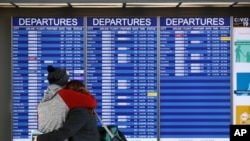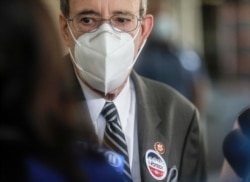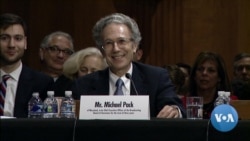This week, Valdya Baraputri had been scheduled to broadcast live from the Republican National Convention. Instead, she and a colleague were on a flight home to Indonesia on Monday, after the U.S. Agency for Global Media did not renew the J-1 visas that allowed them to work for Voice of America.
Baraputri is one of at least 15 VOA language service journalists due to return to their country of origin in coming weeks. Their J-1 visa renewals came up as USAGM’s new leadership initiated a review into the specialized entry permits for individuals with unique skills. Another 20 journalists, including some who are from repressive countries, have visas expiring by the end of the year.
VOA, which broadcasts in 47 languages, relies on the specialized regional knowledge, contacts and language skills provided by its journalists from around the world.
USAGM, which oversees Voice of America and four other networks, announced last month it was conducting a case-by-case assessment of J-1 renewal applications. The chief executive is responsible for giving the final approval of visa renewals submitted by the broadcasters.
Visa review
The review was aimed at improving agency management, protecting U.S. national security and ensuring that hiring authorities are not misused, a USAGM spokesperson said in a July statement.
J-1 visa holders at VOA say the agency failed to communicate clearly with them about their status. Members of Congress, media rights experts and former USAGM senior staff say the visa review is one of several concerning decisions since Michael Pack was appointed CEO in June.
The USAGM did not respond to VOA’s requests for updates or comment. VOA’s public relations department referred requests for comment to USAGM.
In a statement Friday, Rep. Eliot Engel, chair of the House Foreign Affairs Committee, said USAGM has failed to provide answers to Congress about the visa renewal process.
"It's unconscionable that a U.S. government agency would create such fear and uncertainty for people whom we asked to do a job," Engel said. "Congress' attempts to seek answers from USAGM on this matter have been met with silence. It's clear that the agency is just trying to run out the clock until these journalists are forced to leave."
Pack is scheduled to testify before the House committee on Sept. 24.
Engel, a Democrat Party representative for New York, warned that some VOA journalists were at risk, especially those returning to repressive countries that regularly jail or harass the media.
"Mr. Pack still has time to act to resolve this situation, but make no mistake, he is accountable for what comes next. Any harm that comes to these brave individuals will be a direct result of Michael Pack's inaction," Engel said.
VOA journalists forced to leave the U.S. because of the review said they were bewildered and, in some cases, angry.
“I feel like I’m being punished for no reason,” said Baraputri, from VOA’s Indonesian service.
She said the USAGM human resources department had not provided answers to her questions or been communicative, and the reasons given for the review were confusing because she had extensive background checks during the hiring process.
“[Pack will] still need international journalists to carry out VOA’s mission,” Baraputri said.
A broadcast journalist who asked to remain anonymous, and whose visa has expired, also criticized the lack of communication.
“We are being treated as if we are guilty without knowing the resolution of our case,” the journalist said, adding that human resources had not provided answers, only suggested dates for flights to their country of origin.
The journalist said the decision was especially cruel for international staff who were already in the U.S. legally and who had given up existing visas when VOA approached them with job offers. Some have lived in the U.S. for several years and have few connections with the country of origin they are now expected to return to.
“We had a visa, a job, we were in the U.S. legally. We were happy to join [VOA]. We didn’t expect this would turn our lives upside down,” the journalist said. “I wonder if the review was even taking place. We’re just expected to go home without knowing.”
Press freedom groups
U.S. press freedom groups including the Reporters Committee for Freedom of the Press (RCFP) and PEN America have criticized the move.
“At exactly the time when the world needs trusted, accurate news, leadership at USAGM is putting the journalists who know best how to deliver that news on planes home,” Gabe Rottman, director of the Technology and Press Freedom Project at the RCFP, told VOA.
Congressmen including Republican Senators Marco Rubio of Florida and Lindsey Graham of South Carolina, Democratic Senator Richard Durbin of Illinois and others highlighted the critical role VOA and other USAGM broadcasters play in fighting disinformation and providing credible news to audiences in authoritarian countries such as Iran, Russia and China.
In a letter to Pack last month, after he fired the heads of USAGM grantees including Radio Free Asia and Radio Free Europe/Radio Liberty, the senators warned that “malign actors” in those countries are “severely restricting their own free press to hamper access to independent news for their citizens.”
Sanford Ungar, VOA director under the Bill Clinton and George W. Bush administrations and current director of the Free Speech Project at Georgetown University, questioned the motive behind the visa review.
“This is a terrible mistake — and a direct hit to VOA’s ability to perform its legitimate responsibilities. It will weaken the organization and make it more vulnerable to political attack,” Ungar told VOA, adding that it would make it harder for the broadcaster to defend its integrity from attacks by hostile foreign governments.
This week, China’s state-controlled media falsely accused Chinese citizens who work as journalists for VOA of acting as “government mouthpieces.”
In an online editorial published Aug. 23, Beijing authorities said other Chinese who work for the United States should take note of what’s happening to VOA’s foreign journalists.
“Those who still have the illusion that the U.S. government will protect them if they sell out their country and work for the U.S. will only be repeatedly humiliated by (President Donald) Trump,” a translation of the editorial said.
In remarks during an Aug. 11 webinar hosted by the Society for Professional Journalists, Ungar said, “An attack on VOA, an effort to prevent VOA from doing its proper business, ultimately is an attack on freedom of information in many countries around the world where the service is badly needed.”
Defends agency action
USAGM’s CEO Pack has defended the agency’s visa review and efforts to improve security, saying he is taking action following years of problems that government auditors repeatedly flagged. The new CEO has focused on employee background checks as one area of concern.
Grant Turner, a former CEO and chief financial officer for the agency, who is one of at least seven staff the USAGM placed on administrative leave on August 12 over investigations into security issues, said the security review and the J-1 visa issue are part of a pattern of mismanagement in recent months.
Turner told VOA the loss of staff in VOA’s language divisions could lose VOA vital audiences in countries such as Iran, China and Venezuela, where citizens have very limited access to independent news. He added that not renewing visas was “a betrayal of promises” the agency made to foreign reporters who came to work for VOA.
The USAGM said Turner and others were placed on leave to restore “respect for the rule of law in our work.” Turner said he rejects the reasons given for his being placed on leave.
J1 visa status
Since 1961, the Exchange Visitor Program, which includes J-1 visas, has provided short-term work opportunities in the United States for professionals, teachers and foreign students. This April, Trump issued a proclamation suspending some economic immigration as part of measures aimed at assisting the domestic job market during the coronavirus pandemic.
A lawsuit challenging the legality of the order is pending.
Stephen Yale-Loehr, an immigration law professor at Cornell Law School and co-author of “J Visa Guidebook,” told VOA that J-1 and other work-based visa holders bring “substantial economic benefits” to the U.S.
“Many of these jobs are specialized and, depending on the nature of the job, it may not be feasible for an employer to find a U.S. worker to replace them,” he added.
Yale-Loehr said that while visa sponsors do not have legal obligations to renew visas of employees, “They may have a moral obligation if they're sending J-1 workers back to harm's way.”
Visas holders fearing persecution if they return to their home countries have a right to seek asylum, Yale-Loehr said.
Baraputri, who co-hosts a weekly news program for the VOA Indonesian service, said it is much easier to cover issues deemed sensitive in Indonesia from the U.S.
As well as losing their jobs, the journalists are forced to return on flights during the coronavirus pandemic.
In Baraputri’s case, she will have to pay for two weeks in a hotel as a quarantine measure before returning to her multigenerational home in Jakarta.









